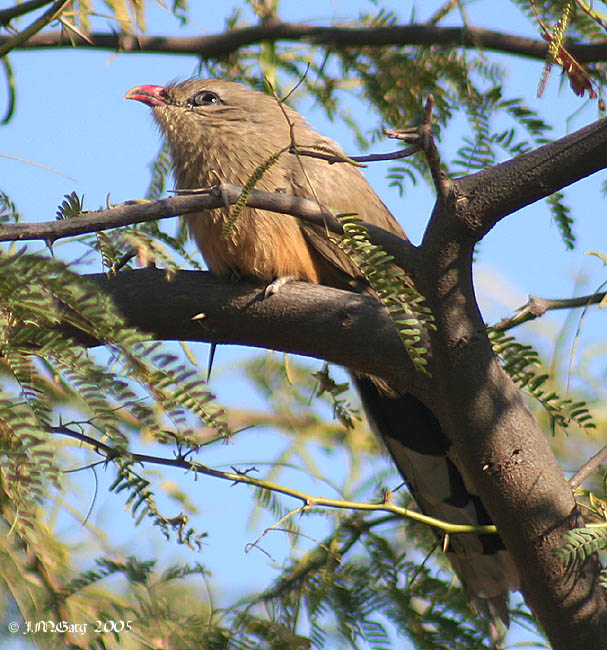|
| 질의: sirkeer malkoha | 결과: 1번째/6 | |
Sirkeer Malkoha (Phaenicophaeus leschenaultii) - Wiki
| 제목: | Sirkeer Malkoha (Phaenicophaeus leschenaultii) - Wiki
| |

| 해상도: 607x650
파일크기: 129880 Bytes
촬영일: 2006:01:04 14:54:13
사진기: Canon EOS 350D DIGITAL (Canon)
F number: f/5.6
Exposure: 1/400 sec
Focal Length: 300/1
등록시간: 2008:01:03 09:00:18
|
Sirkeer Malkoha
From Wikipedia, the free encyclopedia
Order: Cuculiformes
Family: Cuculidae
Synonyms: Taccocua leschenaltii
[Photo] Sirkeer Malkoha (Phaenicophaeus leschenaultii) at Bharatpur, Rajasthan, India. Date: 4.1.06. Author: J.M.Garg (http://commons.wikimedia.org/wiki/User:J.M.Garg). Copyright (C) 2006 J. M. Garg
Permission is granted to copy, distribute and/or modify this document under the terms of the GNU Free Documentation License, Version 1.2 or any later version published by the Free Software Foundation; with no Invariant Sections, no Front-Cover Texts, and no Back-Cover Texts. A copy of the license is included in the section entitled "GNU Free Documentation License". |
The Sirkeer Malkoha or Sirkeer Cuckoo (Phaenicophaeus leschenaultii), is a member of the cuckoo order of birds, the Cuculiformes, which also includes the roadrunners, the anis, and the Hoatzin. It is a resident bird in the Indian subcontinent.
Distribution
All of the sub-Himalayan Indian subcontinent, Bangladesh, Sri Lanka; patchy in Pakistan and Rajasthan. Sometimes considered as three races, varying in colouration.
Description
Size: A largish bird at 42cm.
Appearance: Mainly earthy brown and rufous in colour, and the long heavy tail is edged with prominently white tipped graduated cross-rayed tail feathers. An obvious relation of the Coucal (Crow Pheasant). Bill is hooked, bright cherry-red and yellow. Sexes are similar, but juveniles are duller and barred above.
Habitat: Largely terrestrial, open scrub and thorn jungle, deciduous secondary jungle. Singly or in pairs.
Behaviour: Stalks about amongst thickets like Crow-Pheasant, searching for food; insects, lizards, fallen fruits and berries, etc. Runs swiftly through undergrowth looking like mongoose. Feeble flier, but ascends trees rapidly, hopping from branch to branch with great agility, like the Coucal.
Call: Sharp loud "kek-kek-kek-kerek-kerek-kerek" of the quality of the shrieks of Rose-ringed Parakeet; also reminiscent in a way of call of Barred Jungle Owlet (Glaucidium radiatum)
Food: A variety of insects, caterpillars and small vertebrates. It occasionally eats berries.
Nesting
This cuckoo, like other Malkohas, is non-parasitic.
Season - March to August (varying with latitude)
Nest: a shallow saucer of twigs lined with green leaves, in a thorn bush such as Euphorbia, or sapling 2 to 7 m up.
Eggs: 2 or 3, white, with a chalky texture.
The scientific name of this bird commemorates the French botanist Jean Baptiste Leschenault de la Tour.
http://en.wikipedia.org/wiki/Sirkeer_Malkoha
| The text in this page is based on the copyrighted Wikipedia article shown in above URL. It is used under the GNU Free Documentation License. You may redistribute it, verbatim or modified, providing that you comply with the terms of the GFDL. |
|
^o^
동물그림창고 똑똑전화 누리집
^o^
|
|

